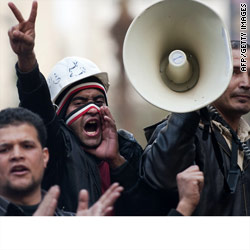Scammer
Banned

-- Thousands of Egyptian workers went on strike Thursday to demand better compensation, adding pressure to a government buckling under massive protests calling for the ouster of President Hosni Mubarak.
Various agencies launched strikes nationwide, including employees in the petroleum, railway and telecommunication industries.
About 2,000 workers are on strike in the petroleum sector, said Hamdi Abdel-Aziz, a spokesman for the petroleum ministry.
They were calling for better compensation and transparency in executive salaries, the spokesman said.
Employees of the National Railway Council called for longer contracts, prompting their leaders to meet with them and pledge to extend their contracts. Some did not return to work Thursday, said Mostafa Qinawi, head of the railway council.
Steel industry and Suez Canal Port Authority employees are demanding better salaries as well, state-run Ahram newspaper said.
Protests sparked fears that the Suez Canal -- a significant oil transport hub -- would be shut down and send oil prices skyrocketing.
But the finance minister said the nation will "do its utmost best" to ensure it remains open.
"All precautions are taken to prevent any sabotage from outside to the Suez Canal," Samir Hadwan told CNN's AC360. "The Suez Canal is safe and the Egyptian Army -- I don't talk on their behalf -- but I can assure you will do whatever is in its power to keep that open."
In the port city of Alexandria, hundreds of street cleaners and administrative staff are on strike over what they say is a salary freeze, witnesses said. At least 1,000 engineers protested contracts and financial compensations, officials said.
Meanwhile, protests in Egypt entered their 17th day Thursday as demonstrators continued their occupation of Cairo's Tahrir Square to demand the ouster of Mubarak.
Government officials have portrayed the imminent threat of chaos if the octogenarian president ends his 30 years of autocratic rule by stepping down right away.
The nation's foreign minister warned of military intervention if that were to occur.
"Do we want the armed forces to assume the responsibility of stabilizing the nation through imposing martial law, and the army in the streets?" Aboul Gheit said on PBS' "NewsHour" Wednesday. "For the army to rule, to step in, to put its friends on the scene, that would be a very dangerous possibility."
Gheit said the president's will not relinquish power immediately because his interest is to protect the stability of the nation.
"He thinks that it would entail chaos and it would entail violence and it would entail also opportunities for those who would wish to act in a manner to threaten the state, the stability of the country and society," Gheit said.
Human Rights Watch has put the death toll at more than 300 since the January 25 rally that ignited the movement.
"Instead of running scared, the regime is fighting back with both words and violence to quash its opponents, portraying the opposition as a foreign-backed, un-Egyptian group of conspirators," Human Rights Watch said on its website Wednesday.
The protests were largely peaceful Wednesday, with demonstrators in one rally composed of children who chanted anti-Mubarak slogans.
"We want the whole regime to end because they are not making our lives any easier," said Yousef Saeed, 11.
Older relatives said they brought the children to the square to witness history unfolding.
"It is the birth of freedom," said Saeed's uncle, Mohammed Mostafa. "Witnessing this event will engrave in them love of this nation, loyalty, freedom and respecting change. I want them to be free."
In Cairo on Wednesday, a crowd hailed a cyberactivist who was seized by security forces and held for 10 days before he was released.
"If you are true Egyptians, if you are heroic Egyptians, it's time to step down," Wael Ghonim told CNN on Wednesday in a message directed to the ruling elite.
The 30-year-old Egyptian father of two administered the Facebook page that is widely credited with calling the first protest.
Ghonim, who is on leave from his Google job in Dubai, said he was prepared to die for the cause.
Mubarak's regime said this week that it had discussed reforms with leaders of various opposition groups and appointed a panel to look into amending the constitution. But its insistence that Mubarak's immediate exit was a recipe for chaos elicited impatience from the Obama administration.
A short White House statement on Vice President Joe Biden's telephone conversation with his Egyprian counterpart Omar Suleiman used the word "immediate" or "immediately" four times.
Biden "urged that the transition produce immediate, irreversible progress that responds to the aspirations of the Egyptian people."
Meanwhile, an Arab diplomat said that Saudi Arabia would consider matching the more than $1.5 billion in military aid that the United States provides each year to Egypt if Washington were to cut it.
